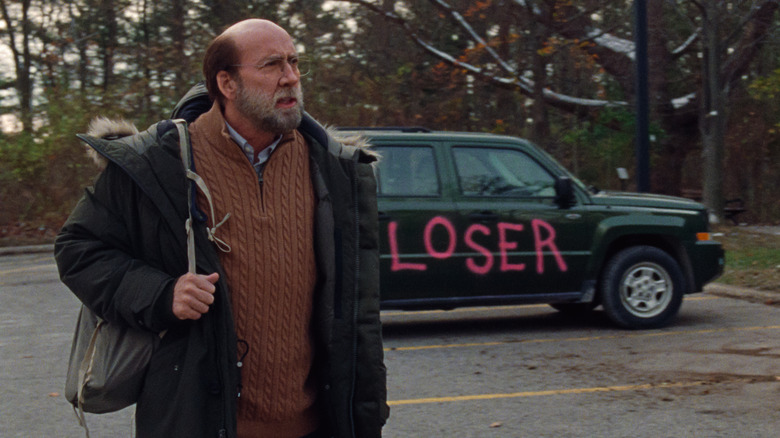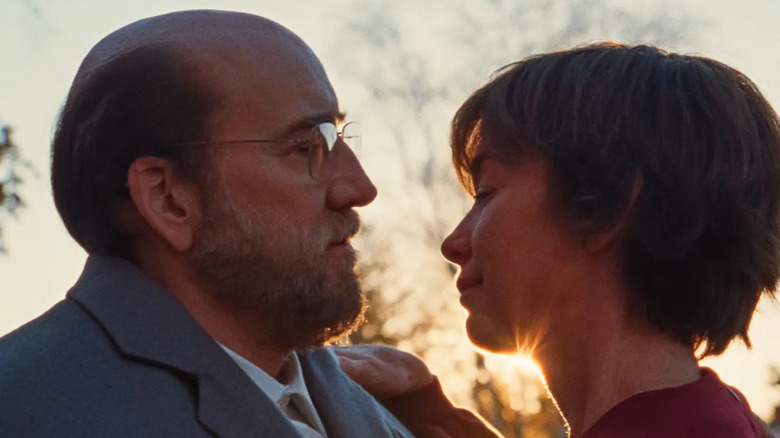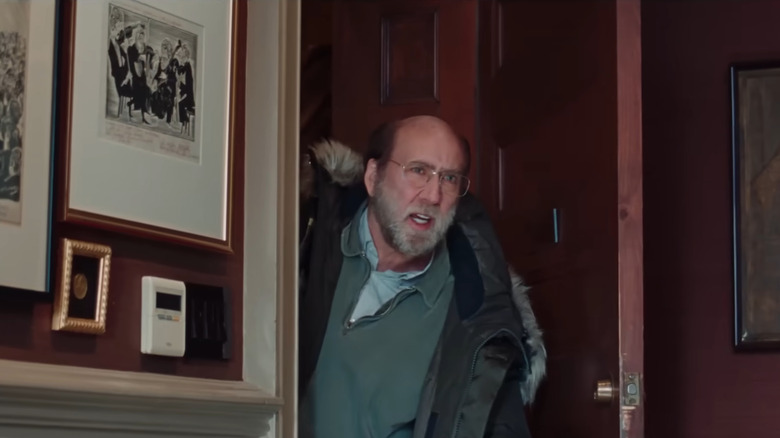Dream Scenario Review: Cage Memes Become Strange Dreams
- Some clever ideas and funny sequences
- As always, Nicolas Cage elevates his material
- It's hard to care about Paul as a character
- The satire is incredibly weak
"Dream Scenario," a new surreal comedy written and directed by Kristoffer Borgli, is very lucky to have cast Nicolas Cage as its lead actor because I don't think this movie would have worked at all without him. Speaking at the film's world premiere at the 2023 Toronto International Film Festival (A24 received an interim agreement from SAG-AFTRA allowing the actors to promote it), Cage explained that he felt an instant personal connection to the script because, as one of the most memed actors of all time, he related to how the character he plays, Paul Matthews, faces an extreme disjunction between who he is in real life and who he becomes in the collective unconscious.
The film's premise — of one unexceptional man showing up in thousands of people's dreams — is itself inspired by an internet meme, the "This Man" publicity stunt. No explanation is given for why Paul is suddenly in everyone's heads, though one turn toward the end of the film points to a scientific explanation for the phenomenon rather than a supernatural one. It's a bit of a one-joke premise, but having Cage in the lead does a lot to help make the joke amusing most of the time. When it comes to trying to extract meaning from this premise, however, "Dream Scenario" gets very messy, with intriguing ideas about the nature of viral celebrity let down by questionable "cancel culture" commentary and a main character who's difficult to really care about.
Missed opportunities with an intriguing premise
Paul Matthews, a schlubby evolutionary biology professor who's ignored or belittled by everyone around him and wants nothing more than to publish a book on ant intelligence ("antelligence," as he calls it), is a profoundly boring man. Even when he first starts showing up in people's dreams, he's not actually doing anything in them, just appearing as a passive observer of whatever is happening. And yet the when same passive observer appears in enough different people's dreams — and when one of those dreamers is a blogger who links to his personal Facebook page — it's enough to turn this boring guy into "the most interesting person in the world."
At first, I thought this story was going to be something in the vein of "Groundhog Day" or "Midnight in Paris," wherein the high-concept unnatural phenomena serve as a means to help the main characters grow or learn a lesson. While he tries to avoid selling out to his new influencer crowd, Paul lets his newfound fame go to his head in other ways. In the film's funniest scene, he comes awfully close to crossing a personal moral line and only stops for embarrassing reasons. Following this scene, the nature of Paul's appearances in other people's dreams shifts from comically passive to nightmarishly violent, and the timing of this shift would make it natural to assume this was some sort of cosmic punishment for nearly crossing that line.
But it turns out the film isn't interested in making such connections or really dealing with Paul's personal issues and instead becomes a story about "cancel culture." Borgli flat-out stated in the post-premiere Q&A that his inspiration came from stories of fired college professors who maintain their innocence of whatever misdeeds they were accused of. It's a questionable reduction of the richer "real self vs. imagined self" themes that made the premise initially intriguing.
Better than it could be, not as good as it should be
For what it's worth, "Dream Scenario" avoids the absolute worst-case scenario for a "cancel culture"-themed film. It makes merchants of anti-woke culture war outrage the butt of the joke enough times to avoid an explicitly right-wing stance. There's one great dig at France's defense of problematic celebrities that had my audience in hysterics. At one point, Paul gives an incredibly self-pitying monologue that's nonetheless so well-acted that I was conflicted on whether I was being manipulated into feeling sympathy for him — only for the self-importance to get mercifully mocked one line later.
My ultimate issue with the movie is that I just don't have much reason to care about Paul being "canceled." He's neither likable enough for me to really feel bad for him as his former fans start to turn on him nor unlikable enough that there's catharsis in seeing him taken down a peg — I'm just completely apathetic about him, except in as much as he's a vehicle for Nicolas Cage to work out his feelings about being turned into a meme. The Cage angle is far more interesting than the falsely accused professor angle.
The story of "Dream Scenario" would probably make a great B-plot for Colin Robinson (Mark Proksch) on "What We Do in the Shadows," or maybe a "Treehouse of Horror" segment on "The Simpsons" where it's Skinner or Flanders or someone in the Nic Cage role. I just don't think it holds together that well as a full movie. The ending, with its connections to another A24 release this fall, is charming enough to leave the theater in a relatively positive mood, but the path getting there is wildly inconsistent, with a few great moments not being enough to make a great film.
"Dream Scenario" opens in theaters on November 10.


